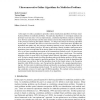Free Online Productivity Tools
i2Speak
i2Symbol
i2OCR
iTex2Img
iWeb2Print
iWeb2Shot
i2Type
iPdf2Split
iPdf2Merge
i2Bopomofo
i2Arabic
i2Style
i2Image
i2PDF
iLatex2Rtf
Sci2ools
108
click to vote
COLT
2001
Springer
2001
Springer
Ultraconservative Online Algorithms for Multiclass Problems
In this paper we study a paradigm to generalize online classification algorithms for binary classification problems to multiclass problems. The particular hypotheses we investigate maintain one prototype vector per class. Given an input instance, a multiclass hypothesis computes a similarityscore between each prototype and the input instance and sets the predicted label to be the index of the prototype achieving the highest similarity. To design and analyze the learning algorithms in this paper we introduce the notion of ultraconservativeness. Ultraconservative algorithms are algorithms that update only the prototypes attaining similarity-scores which are higher than the score of the correct label’s prototype. We start by describing a family of additive ultraconservative algorithms where each algorithm in the family updates its prototypes by finding a feasible solution for a set of linear constraints that depend on the instantaneous similarity-scores. We then discuss a specific ...
Related Content
| Added | 28 Jul 2010 |
| Updated | 28 Jul 2010 |
| Type | Conference |
| Year | 2001 |
| Where | COLT |
| Authors | Koby Crammer, Yoram Singer |
Comments (0)

